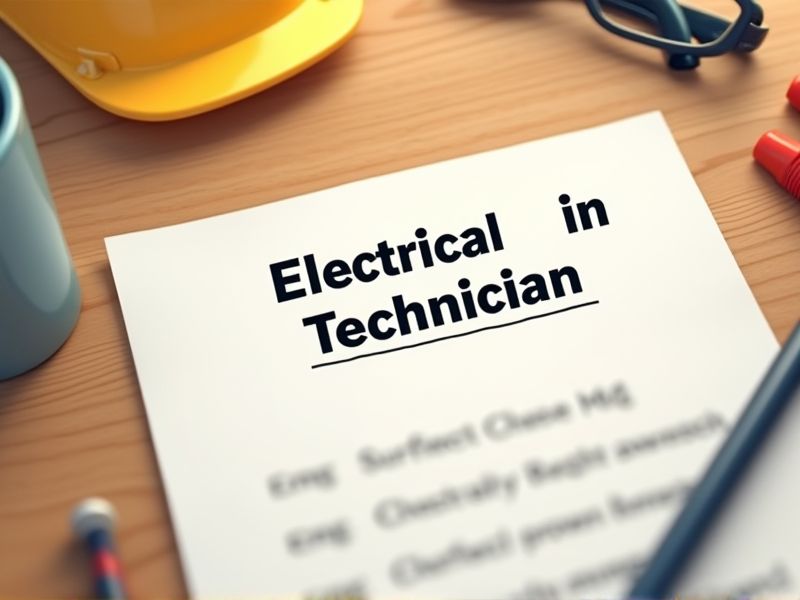
Electrical Technicians in Construction are responsible for ensuring safe and efficient electrical systems, which requires adherence to strict regulatory standards. Without proper certifications, they may lack the necessary knowledge to comply with safety protocols, increasing the risk of hazardous incidents. Certifications also signify a level of competency, enhancing trust among employers and clients in a technician's skill set. Here are some essential certifications you may require for a career as an Electrical Technician in Construction.
OSHA 10-Hour Construction Safety Certification
OSHA 10-Hour Construction Safety Certification equips electrical technicians with essential safety standards, reducing workplace injuries. Understanding potential hazards and safe practices helps prevent electrical accidents on construction sites. Risk assessments and hazard identification become more effective, improving overall project safety. Compliance with OSHA standards often reduces insurance premiums and liability risks for employers.
OSHA 30-Hour Construction Safety Certification
The OSHA 30-Hour Construction Safety Certification equips electrical technicians with vital knowledge to identify and mitigate workplace hazards, reducing accident rates. Understanding safety regulations and proper procedures ensures compliance with federal guidelines, minimizing legal liabilities for employers. Comprehensive safety training enhances the technician's ability to operate safely in high-risk environments, protecting themselves and others. Employers often require this certification to demonstrate a commitment to maintaining a safe construction site and fostering a culture of safety awareness.
National Electrical Code (NEC) Training Certification
The National Electrical Code (NEC) Training Certification ensures electrical technicians in construction understand and adhere to the latest safety standards, reducing the risk of electrical hazards. Compliance with NEC guidelines is often mandated by local and state regulations for construction projects, making certification essential for legal reasons. Possession of NEC certification enhances the credibility and trustworthiness of technicians, potentially opening up more job opportunities. Specialized training through NEC certification can lead to increased efficiency and reliability in electrical installations, contributing to project success and workplace safety.
Certified Electrical Inspector (CEI)
A Certified Electrical Inspector (CEI) ensures that all electrical installations in construction adhere to established safety standards, reducing the risk of electrical hazards. Having a CEI's approval can enhance an electrical technician's credibility, fostering trust with clients and employers. CEIs possess deep knowledge of current codes and regulations, aiding technicians in avoiding costly compliance pit-falls. Professional inspections by CEIs may expedite project timelines by identifying and addressing issues before final project approval.
Journeyman Electrician License
A journeyman electrician license is needed to ensure the technician meets the safety and competency standards required for construction projects. This license validates the technician's knowledge of electrical codes, which is essential for compliance with local and national regulations. It demonstrates the technician's ability to work independently, which is crucial for maintaining project efficiency and reducing oversight costs. Obtaining the license enhances job opportunities and potential earnings in a competitive field.
NFPA 70E Electrical Safety Training Certificate
Construction projects often involve complex electrical systems, and NFPA 70E Electrical Safety Training ensures technicians understand the latest safety protocols, significantly reducing the risk of electrical accidents. Electrical technicians trained under NFPA 70E are better equipped to identify potential hazards, which leads to improved site safety. Compliance with this standard is usually required by regulatory authorities, aiding companies in meeting legal safety obligations. The certificate also enhances a technician's credibility and employability, as it signals to employers that they are knowledgeable about essential electrical safety practices.
First Aid and CPR Certification
Electrical technicians face hazards like electrical shocks and burns, making first aid and CPR crucial for quick response to injuries. On construction sites, immediate medical intervention can significantly increase survival chances in case of an emergency. Possessing this certification can enhance safety compliance and reduce potential liability for employers. Knowledge of first aid and CPR equips technicians to stabilize colleagues or themselves until professional medical help arrives.
Electrical Maintenance and Troubleshooting Certification
Acquiring Electrical Maintenance and Troubleshooting Certification equips an electrical technician with the necessary skills to effectively identify and resolve electrical issues, which reduces downtime in construction projects. Certified technicians are more likely to comply with safety standards, lowering the risk of work-related accidents and ensuring a safer working environment. Certification can often lead to better job opportunities and advancement prospects, as employers value the assurance of proper training and proficiency. It enhances the technician's expertise in new technologies and methodologies, making them adaptable to the evolving demands in the construction industry.
Industrial Control Systems (ICS) Cybersecurity Certification
Industrial Control Systems (ICS) cybersecurity certification is needed for electrical technicians in construction because cyber threats increasingly target critical infrastructure, including construction sites. Having this certification equips technicians to identify and mitigate vulnerabilities in the control systems they work with daily. Many construction projects rely on automated systems, making secure operations vital to preventing unauthorized access. Certification ensures that technicians can implement best practices for protecting sensitive data and system integrity.
Programmable Logic Controller (PLC) Certification
A PLC Certification equips an electrical technician with the necessary skills to effectively program and troubleshoot automated systems, which are prevalent in modern construction projects. As construction sites increasingly integrate technology, possessing this certification ensures compliance with industry standards and enhanced safety measures. The certification bolsters an electrical technician's ability to improve the efficiency and functionality of complex control systems used in building operations. With the growing demand for smart building solutions, certified technicians contribute to project success by minimizing downtime and reducing operational errors.
Summary
When you obtain certifications as an Electrical Technician in Construction, your employability significantly increases due to improved skills and recognized credibility. Employers are more likely to trust your expertise, leading to greater job opportunities and potential salary increases. Certified technicians often receive access to advanced training and resources, facilitating personal and professional growth. The industry also tends to see a decrease in errors and safety incidents as a result of heightened technician competency.
